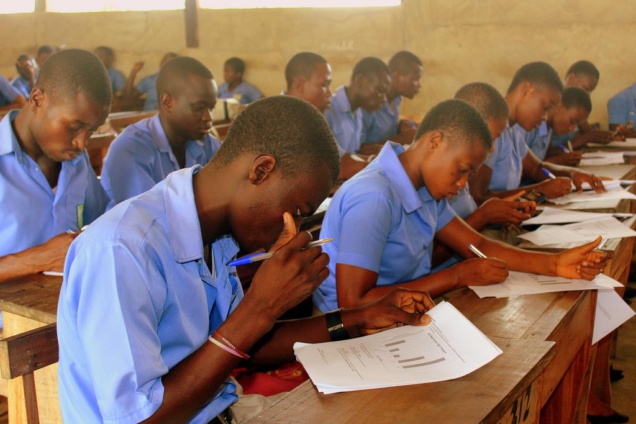Education in Ghana dates as far back as before the coming of the colonisers. Although the colonist classified it as ‘unstructured’ and ‘informal' - it was primarily to develop the potentials of every individual for the benefit of society.
'Formal' [colonial] education began in Ghana between the 1500s and 1900s by the Portuguese, Dutch and English respectively.
The focus of this education was largely reserved for an elite class of urban males. It aimed at reproducing an upper class within the colonial hierarchy to engineer its activities.
It should have been obvious that, the call for independence should have ended the violent imposition of colonial cultures and philosophies, and the destruction of indigenous knowledge and cultures.
Unfortunately, independence came with only a political triumph and even today, the discourses around neocolonialism have been but the same old tale - political and economic independence.
Too little attention has been paid to the most critical phase of breaking ties with imperialism and neocolonialism - education.
More often than not, the media and everyday discourses about the educational system of the country has been centred on the theory versus practice argument [as though both theory and praxis are mutually exclusive] whilst (un)consciously centering white supremacist knowledge production as the accepted means of education.
For many people, education should be a ticket for economic gains - white supremacist capitalist assumptions.
It is, therefore, not surprising we fail to ignore the importance of education as a medium for liberation, developing critical consciousness and the promotion of individual well-being; psychological, physical and social.
The structural system of Ghana's education - curriculum and pedagogical methods alienate participants from the process of individual well-being and development.
The class system; students versus teachers, among students exist another hierarchy seniors versus juniors concomitant with the categorisation of schools into tiers - is evidence of this alienation.
The interactions in classrooms and schools (re)produce one faction exercising systemic authority over another.
Instead of learners and colleagues, the categorisation of students and teachers, as well as among students reinforce an image of subservience of one, and another as a commander.
The students, therefore, become passive participants whose duties are to follow instructions whilst the teacher, the instructor - slave and master relationship.
From basic school, the educational system violently punishes anyone who questions a 'teacher'.
We become socially conditioned to be followers and doers of the words of our teachers(carriers of knowledge) not to develop our own understanding - to be independent of thoughts is punishable by kneeling down, six strokes, how-dare-you-challenge-me and you-don’t-respect.
The learning process of the educational system is shaped to reward grades based on uncritical and unconscious regurgitation of imposed thoughts and decisions.
Competition is more emphasised and those who do not meet the cut-off points are disposed, ridiculed and abused through various capital punishments.
The student who doesn’t meet the principle guiding the school system begins to gradually wallow in inferior complexity, self-hatred and denialism of talents.
The structural system isn’t ahistorical as it is designed to mirror white supremacist capitalist ableist ageist sexist and patriarchal ways of thinking, seeing and engaging in the world.
To solve this problem, there is the need to decolonise the educational system.
That is to dismantle the colonial interactions and ways of learning — pedagogical methods employed should dismantle any hierarchal relationship.
Both the teacher and student must see, think, know, understand and interact as learners and colleagues.
The learning process must be understood as both individual and collaborative with each individual developing and achieving their talents and abilities for the benefit of society.
The curriculum must be designed to suit our worldviews emphasising indigenous knowledge.
We must eshew all forms of white supremacist glorification such as the 'advantages' of colonisation and their mythologies.
Most importantly is to ensure that access to education is universal free and of quality.
The consistent struggle to meet corporatist terminology of 'world-class' education is nothing but an imposition of the ways of colonisers.
We must understand that their ways and ours are distinct and to continue to dream and walk in their couched imperialist worldview would make us stagnant.
We must thrive to develop knowledge and thoughts that suit our realities. Knowledge which is grounded in our philosophies and cultures; material and spiritual - not the ones imposed and adulterated by the colonisers.
Latest Stories
-
Ken Ashigbey, Joyce Aryee and others grace MTN’s Festival of 9 Lessons and Carols
3 hours -
Obuasi Cricket Academy celebrates excellence at end-of-year awards night
4 hours -
WASSCE: Scanning of objective answer sheets to start tonight – WAEC
4 hours -
Education Minister hasn’t prioritised WAEC – Nortsu-Kotoe
5 hours -
Bawumia meets Manifesto Committee members to express appreciation
5 hours -
To chocolate, Ghana’s pride by Bioko
6 hours -
Chartered Institute of Bankers, Ghana, confers Honorary Fellow status on Victor Yaw Asante
6 hours -
BoG marks end of year with Thanksgiving Service
6 hours -
Ghana’s Next Sports Minister: The Debate Begins
6 hours -
Election 2024: NPP advised to be mindful of the reasons being ascribed to their election lost
7 hours -
GNFS urges Ghanaians to prevent fires during yuletide
7 hours -
Report tobacco users who smoke publicly – FDA advises
7 hours -
Abdallah Ali-Nakyea elevated to Associate Professor at UG School of Law
8 hours -
Kick2build commissions 5 libraries in Klo Agogo, donates school supplies
8 hours -
Slim and Fit Ghana donates to kids at Motherly Love Orphanage in Kwabenya
8 hours

